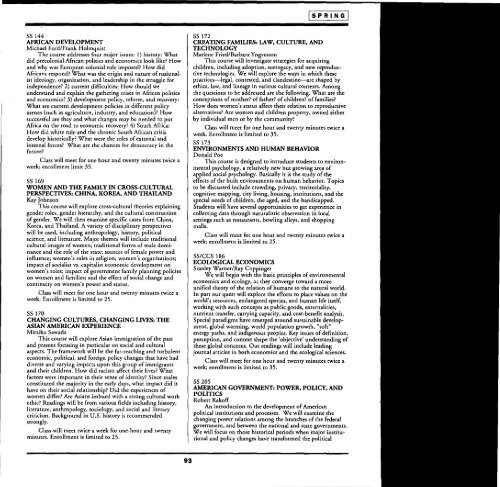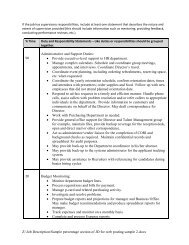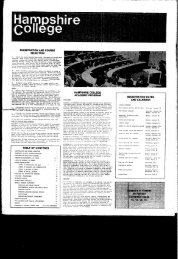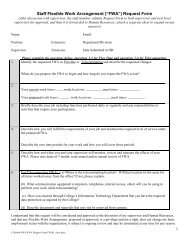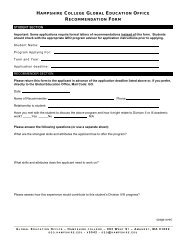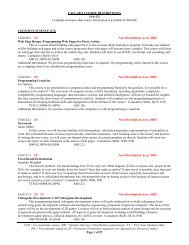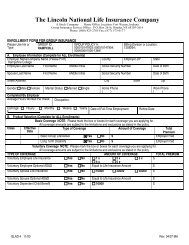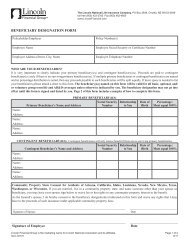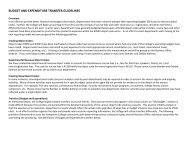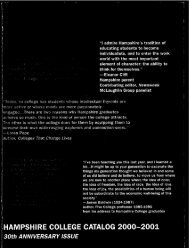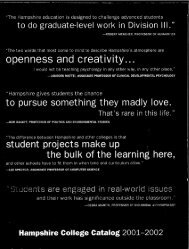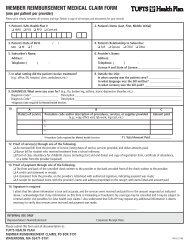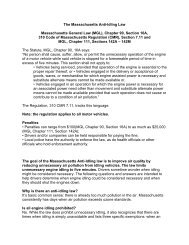school of social science - Hampshire College
school of social science - Hampshire College
school of social science - Hampshire College
You also want an ePaper? Increase the reach of your titles
YUMPU automatically turns print PDFs into web optimized ePapers that Google loves.
SS 144<br />
AFRICAN DEVELOPMENT<br />
Michael Ford/Frank Holmquist<br />
The course addresses four major issues: 1) history: What<br />
did precolonial African politics and economics look like? How<br />
and why was European colonial rule imposed? How did<br />
Africans respond? What was the origin and nature <strong>of</strong> nationalist<br />
ideology, organization, and leadership in the struggle for<br />
independence? 2) current difficuhies: How should we<br />
understand and explain the gathering crises in African politics<br />
and economics? 3) development policy, reform, and recovery:<br />
What are current development policies in different policy<br />
arenas (such as agriculture. industry, and education)? How<br />
successful are they and what changes may be needed to put<br />
Africa on the road to economic recovery? 4) South Mrica:<br />
How did white rule and the chronic South African crisis<br />
develop historically? What were the roles <strong>of</strong> external and<br />
internal forces? What are the chances for democracy in the<br />
future?<br />
Class will meet for one hour and twenty minutes twice a<br />
week; enrollment limit 35.<br />
SS 169<br />
WOMEN AND THE FAMILY IN CROSS-CULTURAL<br />
PERSPECTIVES, CHINA, KOREA, AND THAILAND<br />
Kay Johnson<br />
This course will explore cross-cultural theories explaining<br />
gender roles, gender hierarchy, and the cultural construction<br />
<strong>of</strong> gender. We will then examine specific cases from China,<br />
Korea, and Thailand. A variety <strong>of</strong> disciplinary perspectives<br />
will be used, including anthropology, history, political<br />
<strong>science</strong>, and literature. Major themes will include traditional<br />
cultural images <strong>of</strong> women; traditional forms <strong>of</strong> male dominance<br />
and the role <strong>of</strong> the state; sources <strong>of</strong> female power and<br />
influence; women's roles in religion; women's organizations;<br />
impact <strong>of</strong> <strong>social</strong>ist vs. capitalist economic development on<br />
women's roles; impact <strong>of</strong> government family planning policies<br />
on women and families; and the effect <strong>of</strong> <strong>social</strong> change and<br />
continuity on women's power and status.<br />
Class will meet for one hour and twenty minutes twice a<br />
week. Enrollment is limited to 25.<br />
SS 170<br />
CHANGING CULTURES, CHANGING LIVES: THE<br />
ASIAN AMERICAN EXPERIENCE<br />
Mitziko Sawada<br />
This course will explore Asian immigration <strong>of</strong> the past<br />
and present focusing in particular on <strong>social</strong> and cultural<br />
aspects. The framework will be the far-reaching and turbulent<br />
economic, political, and foreign policy changes that have had<br />
diverse and varying impaCts upon this group <strong>of</strong> immigrants<br />
and their children. How did racism affect their lives? What<br />
factors were important in their sense <strong>of</strong> identity? Since males<br />
constituted the majority in the early days, what impact did it<br />
have on their <strong>social</strong> relationship? Did the experiences <strong>of</strong><br />
women differ? Are Asians imbued with a strong cultural work<br />
ethic? Readings will be from various fields including history,<br />
literature, anthropology. sociology, and <strong>social</strong> and literary<br />
criticism. Background in U.S. history is recommended<br />
strongly.<br />
Class will meet twice a week for one-hour and twenty<br />
minutes. Enrollment is limited to 25.<br />
93<br />
ISPRING I<br />
SS 172<br />
CREATING FAMILIES: LAW, CULTURE,AND<br />
TECHNOLOGY<br />
Marlene Fried/Barbara Yngvesson<br />
This course will investigate strategies for acquiring<br />
children, including adoption, surrogacy. and new reproductive<br />
technologies. We will explore the ways in which these<br />
practices-legal, contested. and clandestine-are shaped by<br />
ethics. law, and Uneage in various cultural contexts. Among<br />
the questions to be addressed are the following. What are the<br />
conceptions <strong>of</strong> mother? <strong>of</strong> father? <strong>of</strong> children? <strong>of</strong> families?<br />
How does women's status affect their relation to reproductive<br />
alternatives? Are women and children property, owned either<br />
by individual men or by the community?<br />
Class will meet for one hour and twenty minutes twice a<br />
week. Enrollment is'limited to 35.<br />
SS 173<br />
ENVIRONMENTS AND HUMAN BEHAVIOR<br />
Donald Poe<br />
This course is designed to introduce students to environmental<br />
psychology, a relatively new but growing area <strong>of</strong><br />
applied <strong>social</strong> psychology. Basically it is the study <strong>of</strong> the<br />
effects <strong>of</strong> the built environments on human behavior. Topics<br />
to be discussed include crowding, privacy. territoriality.<br />
cognitive mapping, city living, housing. institutions. and the<br />
special needs <strong>of</strong> children, the aged, and the handicapped.<br />
Students will have several opportunities to get experience in<br />
collecting data through naturalistic observation in local<br />
settings such as restaurants, bowling alleys, and shopping<br />
malls.<br />
Class will meet for one hour and twenty minutes twice a<br />
week; enrollment is limited to 25.<br />
SS/CCS 186<br />
ECOWGICAL ECONOMICS<br />
Stanley Warner/Ray Coppinger<br />
We will begin with the basic principles <strong>of</strong> environmental<br />
economics and ecology. as they converge toward a more<br />
unified theory <strong>of</strong> the relation <strong>of</strong> humans to the natural world.<br />
In pan our quest will explore the efforts to place values on the<br />
world's resources, endangered species, and human life itself,<br />
working with such concepts as public goods, externalities.<br />
nutrient transfer, carrying capacity. and cost-benefit analysis.<br />
Special paradigms have emerged around sustainable development,<br />
global warming. world population growth. "s<strong>of</strong>t"<br />
energy paths. and indigenous peoples. Key issues <strong>of</strong> definition,<br />
perception, and context shape the 'objective' understanding <strong>of</strong><br />
these global concerns. Our readings will include leading<br />
journal articles in both economics and the ecological <strong>science</strong>s.<br />
Class will meet for one hour and twenty minutes twice a<br />
week; enrollment is limited to 35.<br />
SS 205<br />
AMERICAN GOVERNMENT, POWER, POLICY, AND<br />
POLITICS<br />
Robert Rak<strong>of</strong>f<br />
An introduction to the development <strong>of</strong> American<br />
political institutions and processes. We will examine the<br />
changing power relations among the branches <strong>of</strong> the federal<br />
government, and between the national and state governments.<br />
We will focus on those historical periods when major institutional<br />
and policy changes have transformed the political


